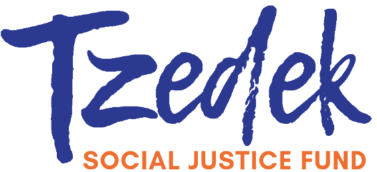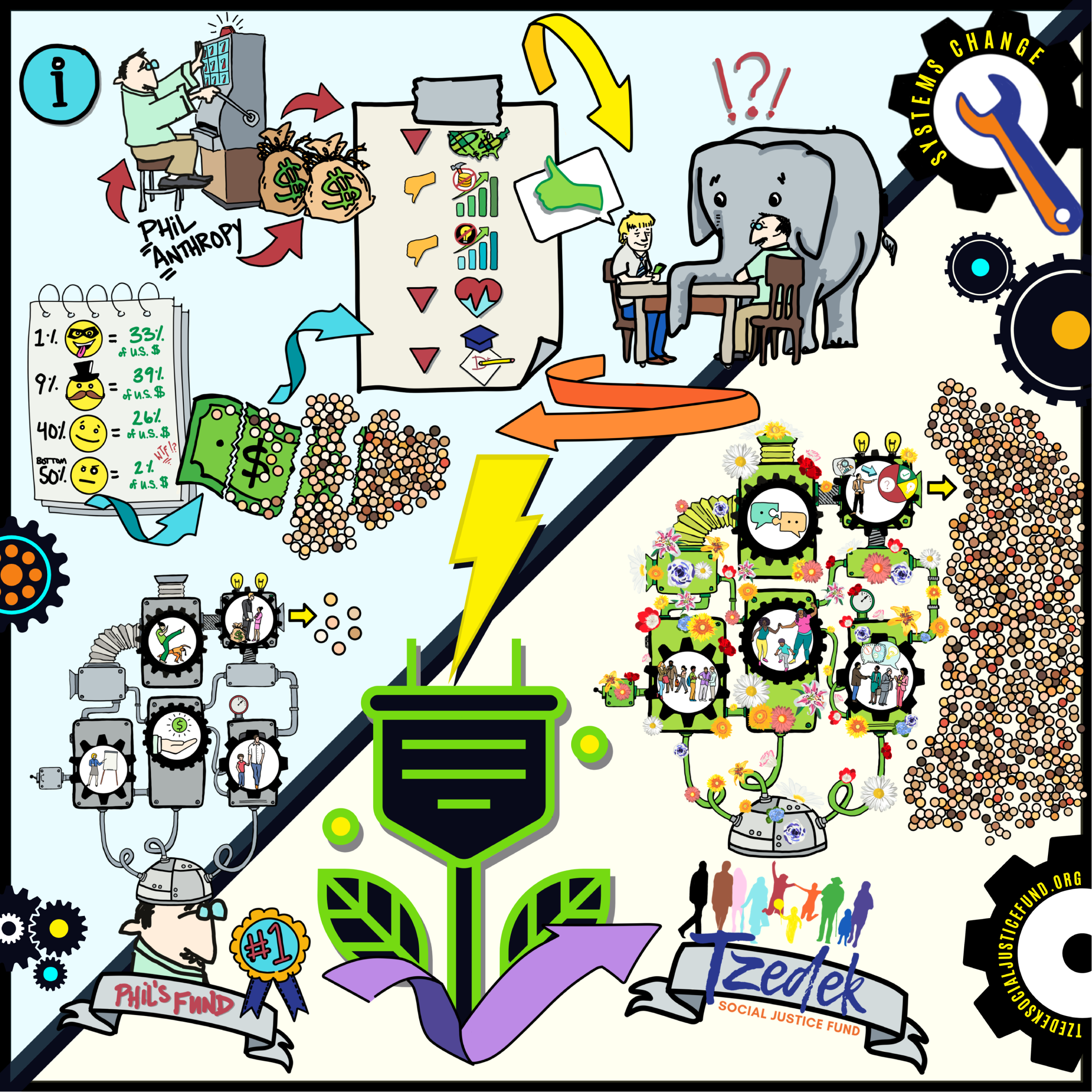Available in Español
What does it look like for a philanthropic organization to redistribute financial resources and POWER in practice? What organizational power dynamics, decision making processes, and power structures are calling to be transformed? And why is doing power differently so important for the Tzedek Social Justice Fund?
Wrestling with these questions has pushed us to get clear on the history and culture of the philanthropic sector and how we want to show up.
Here’s what we know.
First, the wealth that we are redistributing was accumulated through an unjust economic system and devalues the labor and lives of so many human beings.
Second, those with wealth do not have the expertise and wisdom to design the programs and strategies that will meaningfully transform systems of oppression.
Third, hoarding money and power costs everyone–both those who have direct experience navigating systems of oppression and those with money and power.
Finally, redistributing financial resources is not enough. Systems change requires that funders redistribute power.
Over the last several years, we’ve learned that redistributing power isn’t simply about changing the organizational chart or making decisions more democratically.
Rather, redistributing power requires upending patterns of dominance by…
- Shifting our ideas about expertise, specifically recognizing grantees as experts and acknowledging that lived experience of systemic oppression is a source of wisdom
- Shifting from a charity mindset to a practice of solidarity by co-creating organizational strategy and practice alongside the communities we fund
- Shifting from paternalism to collaboration by soliciting and responding to feedback
- Shifting from power over to a stance of humility, grounded in clarity about what we don’t know
- Shifting from unconsciously wielding power over others to taking responsibility for the costs of hoarding power
But how can a philanthropic organization redistribute power in our day-to-day work?
Tzedek has worked to shift power internally in tangible ways including…
- Changing our name from one focused on individuals to one centering our values as a concrete effort to move beyond personalities and towards a collectively-led organization
- Grounding our strategic plan and theory of change in a community research process
- Interrogating individual relationships to power, specifically our relationships to white supremacy culture and our tendencies to embrace and reproduce power-over dynamics in the workplace through training, coaching, and intentional organizational culture building
- Shifting from an all white-woman staff to a Black-woman-led team of staff who better represent the Asheville communities Tzedek supports
- Convening a Board of Directors with lived experience navigating systems of oppression and expertise leading systems change at the grassroots-level
- Hiring staff from outside philanthropy, with the goal of disrupting dominant frameworks of the sector and bringing in outside perspectives
- Learning in public by admitting missteps and sharing the messy and chaotic process of change
These approaches take time and effort, humility and creativity. Yet, we have seen the impact of shifting Tzedek’s relationship to power.
The rifts rooted in mistrust and power hoarding, that are so common between funders and grantees, are healing. As grantees see us learn from their feedback and shift our practices, trust deepens. Communication with our grantees is more transparent. Money is flowing to where it is needed, as our strategy is more deeply informed by our grantee partners. Our collaborations with other funders and community partners have strengthened as we share our journey. Our new offerings are better aligned with what Asheville’s LGBTQ, BIPOC, and Jewish communities need. Finally, there is a marked shift in the wellbeing of our team as the corrosive effects of power hoarding recede.
Redistributing power has made our work more joy-filled, seamless, and impactful.
Unraveling paternalism, power over, and power hoarding are inextricably linked to Tzedek’s mission–to support systems change and community healing. We can disrupt colonial and capitalist systems that concentrate wealth and power in the hands of a few, equate financial abundance with expertise, and make power opaque. We do it by redistributing executive leadership power to community, sharing decision making power with community leaders, and transparently naming power. And we can support community healing by honoring and trusting the inherent power of people.
Over the next couple of weeks, we’ll offer a glimpse into our organizational practices. We’ll share how we’re redistributing power through our community-led Board and community-led grantmaking and using a liberatory approach to power through our storytelling and communications. We invite you to follow along and to ask yourself — what could redistributing power look like in my work? We ask you to join us, to be a part of a much wider effort to upend the old ways of doing philanthropy.
Sources:
Kaplan, J. & Hoff, M. (2022, September 29). The bottom half of American families hold just 2% of the country’s wealth – while the top 1% of families have a third. Business Insider. https://www.businessinsider.com/bottom-half-americans-hold-2-percent-wealth-richest-have-third-2022-9
Seven Pillars Institute. (2015). The consequences of income inequality. https://sevenpillarsinstitute.org/consequences-economic-inequality/

